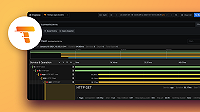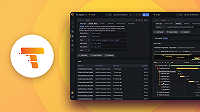Important: This documentation is about an older version. It's relevant only to the release noted, many of the features and functions have been updated or replaced. Please view the current version.
Google Cloud Functions
This document will walk you through setting up a Google Cloud Function for serverless backend search. For more guidance on configuration options for full backend search check here.
Build the code package:
cd ./cmd/tempo-serverless && make build-gcf-zipThis will create a ZIP file containing all the code required for the function. The file name will be of the form:
./cloud-functions/tempo-<branch name>-<commit hash>.zip. Here is an example of that name:ls cloud-functions/*.zip cloud-functions/tempo-serverless-backend-search-297172a.zipProvision a GCS bucket.
Copy the ZIP file into your bucket.
gsutil cp cloud-functions/tempo-serverless-backend-search-297172a.zip gs://<newly provisioned gcs bucket>Provision the Google Cloud Function. This example uses Terraform:
locals { // this can be increased if you would like to use multiple functions count = 1 } resource "google_cloudfunctions_function" "function" { count = local.count name = "<function name>-${count.index}" description = "Tempo Search Function" runtime = "go116" available_memory_mb = 1024 source_archive_bucket = <GCS bucket created above> source_archive_object = "tempo-serverless-backend-search-297172a.zip" trigger_http = true entry_point = "Handler" ingress_settings = "ALLOW_INTERNAL_ONLY" min_instances = 1 // Tempo serverless functions are configured via environment variables environment_variables = { "TEMPO_GCS_BUCKET_NAME" = "<GCS bucket name backing your Tempo instance>" "TEMPO_BACKEND" = "gcs" "TEMPO_GCS_HEDGE_REQUESTS_AT" = "400ms" "TEMPO_GCS_HEDGE_REQUESTS_UP_TO" = "2" } }Add the newly-created functions as external endpoints in your querier configuration. The endpoint can be retrieved from the trigger tab in Google Cloud Functions:

querier: search: external_endpoints: - <trigger url from console>


